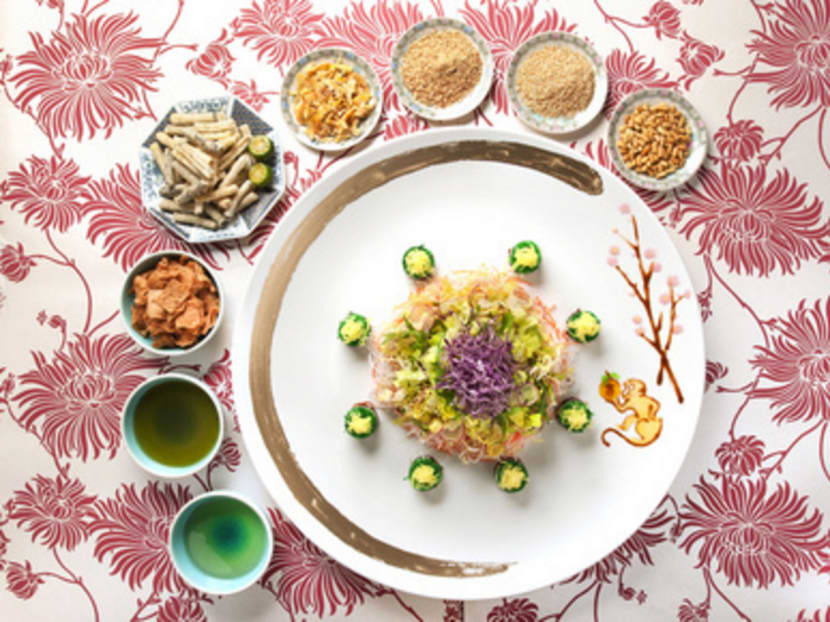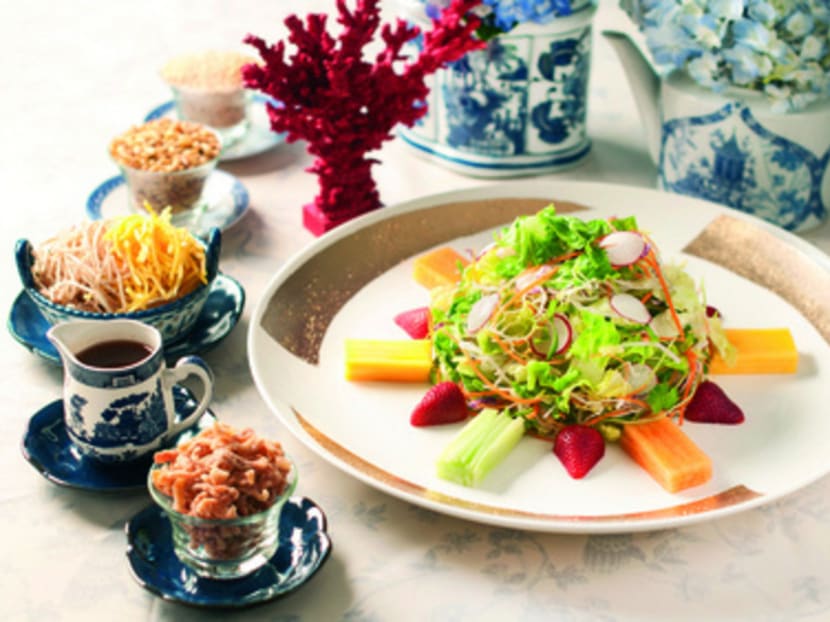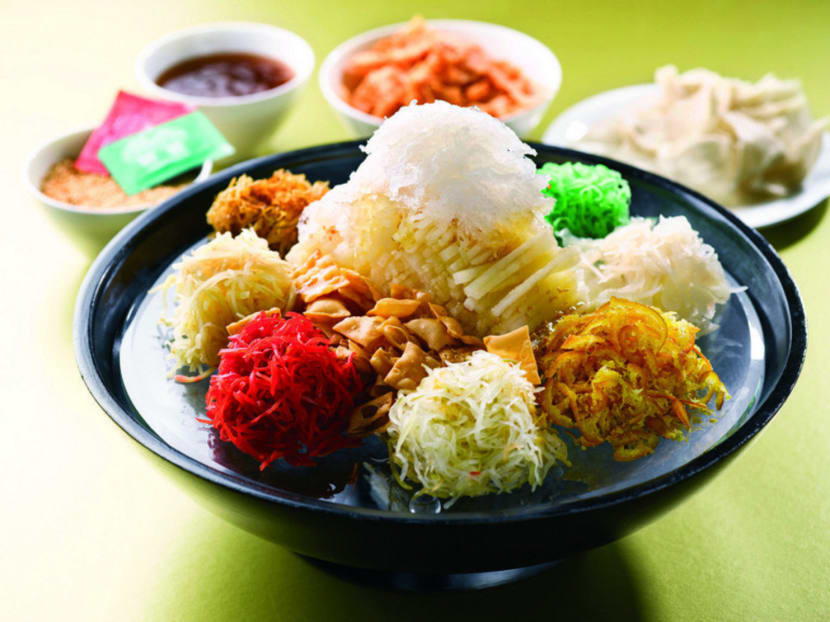What to do if there’s no raw fish in the yu sheng?
Are people deterred from eating yu sheng this coming Chinese New Year? The health scare due to the Group B Streptococcus (GSB) infections that occurred in the last few months from eating raw Song (bighead carp) and Toman (snakehead) fish certainly hasn’t helped. Even if the celebratory yu sheng salad traditionally feature ikan parang (wolf herring), the now-ubiquitous salmon and sometimes the more expensive kingfish or amberjack.



Are people deterred from eating yu sheng this coming Chinese New Year? The health scare due to the Group B Streptococcus (GSB) infections that occurred in the last few months from eating raw Song (bighead carp) and Toman (snakehead) fish certainly hasn’t helped. Even if the celebratory yu sheng salad traditionally feature ikan parang (wolf herring), the now-ubiquitous salmon and sometimes the more expensive kingfish or amberjack.
This year, a number of restaurants, including yu sheng pioneers Dragon Phoenix Restaurant and Red Star Restaurant, have decided to give raw fish a miss on their menu, replacing the star raw ingredient in this customary lo hei with equally auspicious alternatives, such as smoked salmon, cooked abalone and even lobster.
Gao Ji Food, for example, which owns and operates three Chinese restaurants — Gao Peng Cuisine, Noodlestar and House Of Roasted Duck — has also opted for alternatives, with the chefs coming up with “their speciality lo hei creations”, said its managing director Chong Yik Hwee. These include Gao Peng’s Prosperity Lo Hei with silver fish and abalone slices in yuzu sauce; Noodlestar’s abalone slices with fruits; and House Of Roasted Duck’s choice of duck meat as the main ingredient.
“Our creations are proof that there are other ingredients that can be used for an enjoyable lo hei and in replacement of raw fish, without losing its festive meaning,” he added.
Prima Tower Revolving Restaurant is serving three varieties of lo hei dishes sans the use of raw fish, and it has kept prices the same as last year, despite using more expensive ingredients such as abalone. (It ranges from S$58 for a small serving to S$88 for a large portion.)
“Abalone symbolises good fortune and is a popular ingredient eaten during Chinese New Year,” said its executive chef Chan Sung Og. “Despite the higher costs, we hope to provide the best for our diners during this festive period.”
To boot, Goodwood Park Hotel is including a yu sheng variation made with mock tuna (essentially, compressed watermelon to mimic the fish’s texture and colour), as part of its new adaptations. But the hotel said the approach has been a progressive one.
“Two of this year’s non-raw fish lo hei — the crispy salmon skin lo hei from Min Jiang (at Goodwood Park Hotel) and a ‘fruit’ option with bacon and white truffle oil from Min Jiang at One-North — were conceptualised in September,” said Justina Loh, the hotel’s director of marketing communications.
“We have had guests previously requesting for non-raw fish yu sheng options to cater for families with children and those who do not like eating raw fish,” she added, pointing out that the idea for this year’s dishes are based on the feedback “as well as taking into account the growing concerns about raw fish”.
Loh also said that following the ban on freshwater fish in ready-to-eat raw fish dishes on Dec 5, the hotel’s management made the decision to remove raw fish in dishes during the upcoming festivities.
“Even though the ban does not extend to saltwater fish, it is a precautionary measure by the hotel — just in case the situation worsens,” Loh affirmed. “Min Jiang and Min Jiang at One-North will continue to serve abalone yu sheng and raw lobster yu sheng; the other two new lo hei creations — the crispy silver bait with mock tuna, and the (one with) crispy eel — were added in mid-December as replacements for the raw fish yu sheng.” The latter was meant to replace the basic ikan parang yu sheng and is priced at S$62 for a small serving) as the eel is prepared in-house.
Meanwhile, another stalwart, Putien, has decided to swap raw fish with Arctic surf clams, which can be replaced with abalone at an additional cost. Cassia at Capella Singapore has similarly decided to use abalone in place of raw salmon, although the latter is available upon request.
SAFE NOT SORRY
While there will be paranoid diners like Madam Yong, 66, who has decided to skip the lo hei dish entirely this year, the mood surrounding the customary new year salad remains upbeat, as several restaurants continue to promote premium and creative alternatives on top of the conventional salmon yu sheng and options featuring other seafood.
Even so, there are consumers who remain wary, if not somewhat overly cautious when it comes to eating any type of raw fish.
“I never really ate sashimi (often), but later on, I started having it again because I heard that it’s safe if handled correctly,” said make-up artist Clarence Lee. “And it was also mentioned in the papers that (the GBS cases) did not affect sashimi in Japanese restaurants.”
But he is choosing to “play it safe”, opting to go without raw fish of any kind in his lo hei dishes this year.
Clearly, “better safe than sorry” is the adage of the moment. Seven out of 10 consumers (aged between 30 and 70) TODAY spoke with felt it would be best to avoid raw fish.
“I will replace it (with something appropriate),” said Wong Sin Hoong, marketing communications manager, Asia Pacific Region, Kodak Alaris Singapore, whose friend was helping raise funds to aid one of last year’s GBS victims.
“I’m very kiasi after what happened ... (his limbs) had turned black and had to be amputated; it’s not worth the risk,” she shared.
Some restaurants, though, paint a slightly less dire situation. “Feedback from our staff indicates that consumers are not very much affected by this as we have yet to receive enquiries from diners about raw fish being used,” said Regent Singapore’s director of food and beverage Alessandro Baccarelli, who affirmed that guests are the most important factor in the hotel’s decisions, guiding the food and beverage selections it offers.
“At the same time, we are concerned with doing so in a responsible manner. Internally, we have discussed the potential concerns that may arise from the recent incidents and, as such, while we have decided to keep the raw fish yu sheng on (Summer Palace’s) menu, the restaurant is also pleased to offer alternatives.”
These include vegetarian options, as well as a crispy fish skin with jellyfish “yu sheng”, and a choice with bird’s nest and pear.
This should please diners such as actress Debra Teng, who swears she “could eat sashimi every day”. “We usually use salmon in the (lo hei), anyway; and I do not have any worries when it comes to eating saltwater fish,” she said.
“In general, though, we do feel that the public is more cautious about raw fish consumption,” Loh said. “After we made the decision (to not include raw fish), all our guests were subsequently informed, including those who had confirmed their bookings.
“None were against the replacement of the raw fish in our menus.”
Click to eat: For more delish deals and news on what’s hot on the scene, download the 8 Days Eat App at http://www16.mediacorp.sg/8days/8daysapp2.html.





